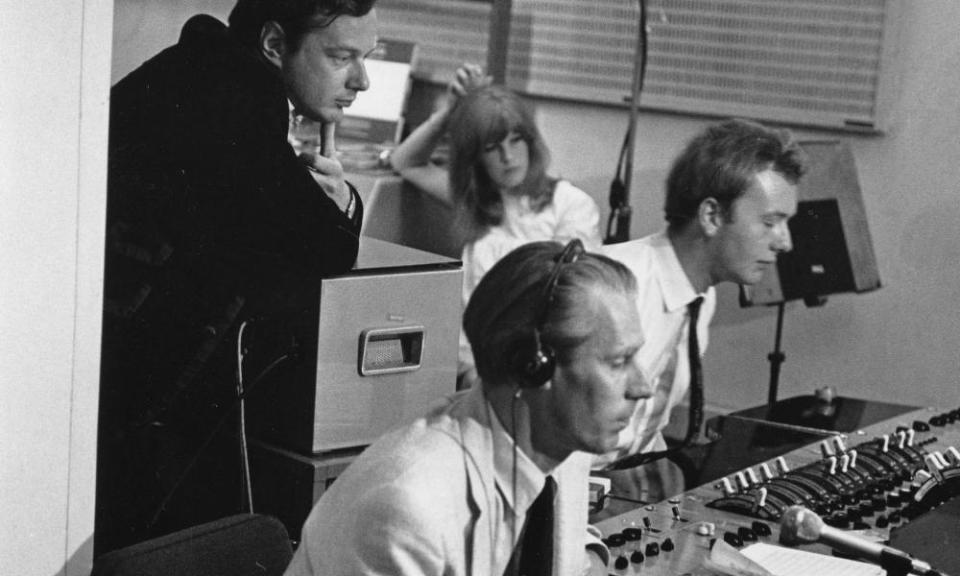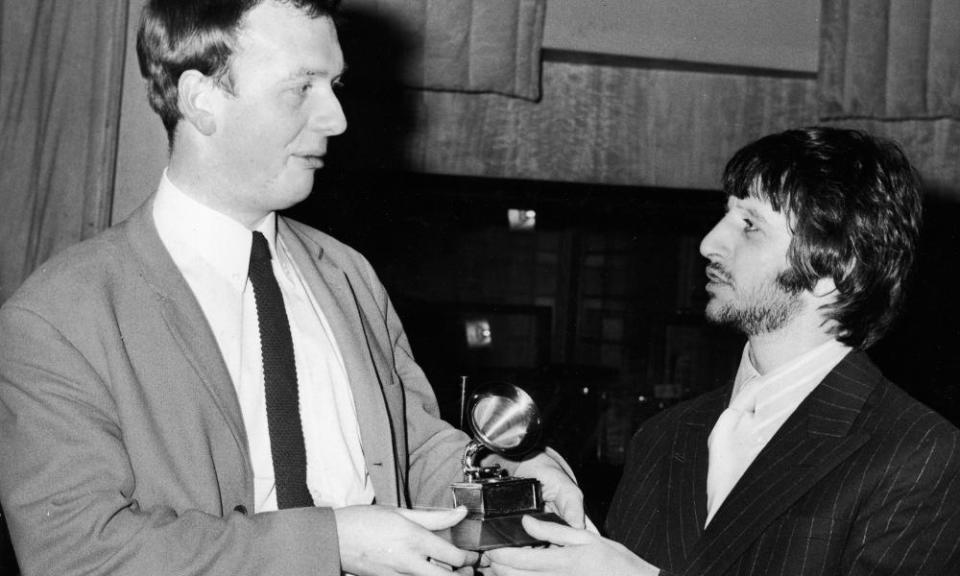Geoff Emerick obituary

Even if Geoff Emerick, who has died following a heart attack aged 72, had never recorded a note with the Beatles, his list of credits as a recording engineer and producer would be impressive, ranging from Art Garfunkel, Elvis Costello, Supertramp and Ultravox to Big Country, Mahavishnu Orchestra and Jeff Beck. He even engineered the demo tape by Kate Bush (produced by David Gilmour of Pink Floyd) that secured her an EMI recording contract.
But it was his work with the Beatles during their most frantically creative years that made his name. Having worked on numerous Beatles tracks at Abbey Road studios as assistant engineer, he was promoted to first engineer in 1966 at the prompting of their producer, George Martin, and his first job in his new post was to record Tomorrow Never Knows, for what would become the Revolver album.
That he was able to rise to the challenge of this extraordinary track and its mixture of psychedelic mind-expansion and Oriental philosophy (including John Lennon’s famous request for his vocal to sound like “thousands of Tibetan monks chanting on a mountain top”) was an auspicious sign for his future with the quartet, even if, as Emerick said, “to get some of the things on Revolver I had to abuse the equipment, and got into trouble sometimes with the management”.
The musical revolution of the Beatles mirrored society’s changes, though it took time to penetrate the staid universe of EMI Records. “EMI was classically based at that time,” Emerick recalled. “They recorded Maria Callas and Elisabeth Schwarzkopf and all these wonderful people … The pop people were like the dregs, except their records paid for the classical sessions.”
After the Beatles found that they were unable to replicate the songs from Revolver in live performance, they took the momentous decision to focus solely on studio work. As they were about to start work on Sgt Pepper’s Lonely Hearts Club Band, Lennon came into the studio and (in Emerick’s words) “said ‘we’re never going to tour again and we’re going to make an album that’s going to have sounds on it that no one’s ever heard before’. And everyone looked at me.”
Thus Emerick became involved in such innovative procedures as chopping up pieces of tape of calliopes and fairground organs for Being for the Benefit of Mr Kite, and recording the orchestral glissandi and colossal “final chord” of A Day in the Life. “The night we put the orchestra on it, the whole world went from black and white to colour,” Emerick said. The 1967 album won him a Grammy for best engineered recording – non-classical.
He worked on further Beatles singles including All You Need Is Love and Lady Madonna, and on the Magical Mystery Tour album, but walked out in the middle of the White Album sessions, frustrated by the group’s arguments and interminable retakes of songs. “It was something like the eighth attempt at Ob-La-Di, Ob-La-Da. They were arguing, and I could see the whole thing disintegrating.”

Emerick was not involved in the subsequent bad-tempered sessions for the Let It Be album, but rejoined the Beatles camp when Paul McCartney asked him to rebuild the recording studio at the Beatles’ Apple Corps building in Savile Row, then invited him to engineer The Ballad of John and Yoko, which became the group’s final No 1 single. Emerick then worked on the Abbey Road album (1969), which brought him a second Grammy.
Geoff grew up in Crouch End, north London. His father, George, was a butcher, and his mother, Mabel, had been a dressmaker before the second world war. The young Geoff found early inspiration from listening to his grandmother’s collection of classical recordings. He attended Crouch End secondary modern school, where one of his teachers heard about a job vacancy at EMI and suggested Emerick should apply. Thus, at age 15, he became an assistant engineer. The fifth of June 1962 was his first day at work, and on the following day the Beatles came to Studio 2 at Abbey Road for their first recording session for EMI, during which they cut an early version (with Pete Best on drums) of what would be their first single, Love Me Do.
Emerick worked on many of the group’s early recordings, and with other EMI artists including Judy Garland, Marlene Dietrich, Rolf Harris, the Goons and the classical conductor Otto Klemperer. In 1966 he engineered Manfred Mann’s UK chart-topper Pretty Flamingo.
After the Beatles split up, Emerick worked regularly with McCartney, and won a third Grammy for his efforts on Band on the Run (1973), for which he had to partially rebuild EMI’s studio in Lagos, Nigeria. He later worked on McCartney’s discs London Town (1978), Tug of War (1982) and Flaming Pie (1997). For Elvis Costello, Emerick produced Imperial Bedroom (1982) and All This Useless Beauty (1996). He engineered Robin Trower’s album Bridge of Sighs (1974), a Top 10 hit in the US, and produced Nick Heyward’s North of a Miracle (1983), which reached No 10 in the UK. In 2003 he received the Recording Academy’s Technical Grammy award.
In 2006 Emerick published an autobiography, Here, There, and Everywhere: My Life Recording the Music of the Beatles. It caused some controversy for alleged factual errors and negative remarks about George Harrison, with another Beatles engineer, Ken Scott, rebutting some of Emerick’s claims in his own book Abbey Road to Ziggy Stardust (2012). In 2007 Emerick oversaw a 40th-anniversary re-recording of Sgt Pepper’s Lonely Hearts Club Band featuring various artists including the Killers and Oasis.
From 1984 Emerick lived in Los Angeles. In 1976 he met Nicole Graham, who was working in the LA office of Chrysalis Records. They were married from 1988 until her death in 1993.
• Geoffrey Emerick, recording engineer and producer, born 5 December 1945; died 2 October 2018

 Yahoo News
Yahoo News 